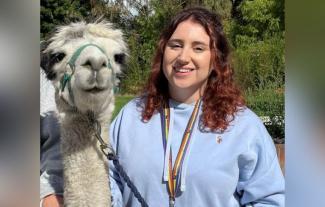
Learning to love my voice

Heather Aspain didn't think she could become a speech & language therapist because of her stammer. That was until a defining moment helped her think differently.
Growing up, I wasn't too aware of my stammer. I lived in blissful ignorance, because that was me. It was how I spoke and I never thought twice about it. I never paid attention to how anyone else spoke, and if I was 'different'. I was aware, but unaffected, and by the time I had started secondary school my speech seemed fine to me. I had a good few years where I spoke fluently, and my childhood stammer was a distant memory.
As I reached adulthood, the pressures of work and relationships crept in; my stammer did too. It was just once or twice at first, if I was stressed or nervous — but I thought that normal. Everyone stammers when they're nervous.
Crossroads
In 2019 I came to a crossroads in my life. I was in a career I wasn't enjoying and I knew I wanted to do something more fulfilling with my life. I had been through speech therapy for my stammer as a child, and that was always something I had always gravitated towards. It felt like the right time to do it. I wanted to help children like me; I wanted to know children out there could feel confident in their speech, whether they stammered when they said their name or not. I applied for a speech and language therapy course at university with doubts I would even get in, but amazingly I did — and I couldn't have been happier!
How could I be a therapist who stammered?, I thought. How could I help children feel confident in their speech when I didn't in my own?
That's when my stammer came back — along with the imposter syndrome. How could I be a therapist who stammered?, I thought. How could I help children feel confident in their speech when I didn't in my own? I felt embarrassed and ashamed. I would stop midway through sentences or feel myself turning red. I felt as though I had taken for granted all those years I'd spent speaking fluently. It was lonely and isolating; it seemed that no one else struggled to speak like I did. In online discussions people would think I was having technical difficulties when I was just trying to get my words out. Something as simple as wanting to talk about the sunset with my boyfriend was a challenge. I couldn't get out the words I wanted to say and I felt defeated.
Not hiding
That was my defining moment. I decided that if I was going to stammer, I wouldn't shy away from it anymore. I won't be embarrassed because this is who I am. I still had worries around what kind of therapist I would be, but I would be one who stammers with pride. I was still doubtful, until I spoke to one of my lecturers who taught stammering. Her passion and pride for the subject really cemented that this is what I wanted to do. I don't just want to help people in therapy, I want to advocate for myself and others. I want people to know that there's nothing wrong with how we speak, it's something unique and it's what makes us who we are.
I don't hide my stammer anymore because I don't want to hide who I am. I am proud to say I am Heather, I stammer and I won't hide it.
Read more Your Voice articles. Would you like to write something? See Submit Something For The Site or email editor@stamma.org for details.



































